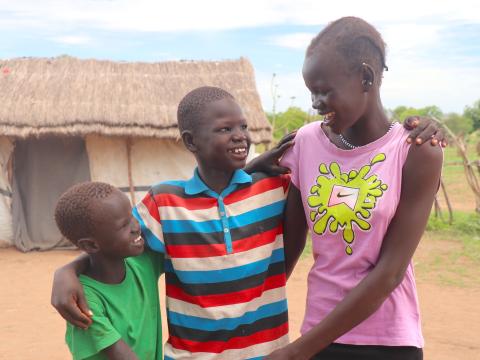South Sudan’s children share their struggle, persistence and courage against conflict, flooding and hunger

Abul and her family are from South Sudan’s Jonglei State, but were displaced due to floods in 2020. They now live in Juba County. Abul’s mother abandoned them with their grandmother when their father died.
“We were left in the care of our grandmother Abuol," Abul says. She became the young guardian to her two siblings Mabior 12, and Yol, 9.
Abuol, now 76, says, “When my only son died, his widow was overwhelmed with responsibility and just left. To raise the children, I farmed in our small plot of land so they can eat.”

“We got separated from our grandmother and got ferried by the boats rescuing people. We have nothing except each other,” Abul recalls. It took them three days to reach Juba County where they received assistance to settle in.
“A neighbour helped put up the shelter for us, but for a month, we suffered from hunger. To survive, we collected firewood and charcoal, sold them for food. Many people did the same thus selling was harder,” Abul further says.

Her brothers started to go to school while Abul stayed home to do house chores. “When my grandmother came after several months, I was happy, but burdened by the responsibilities,” she adds.
Children experiencing chronic hunger could develop learning disabilities or other cognitive impairments and have trouble focusing in school due to a lack of energy and motivation.
Mabior always did his best to support his sister. When there are no resources and food, they have to skip school to find ways. They receive food assistance, but it is not enough for the whole family.
Protection Officer Malish Obede says, “Abul with her two brothers Mabior and Yol are supported by World Vision through case management services. They also attend daily psychosocial support activities.”

Through the project supported by the South Sudan Humanitarian Fund (SSHF), they were supported with mattresses, sleeping mats, carpets and food through the general food distribution programme.
Advocacy and Protection Manager Betty Adong shares, “Severe hunger affects children’s physical and mental health and academic functioning. Children experiencing chronic hunger could develop learning disabilities or other cognitive impairments and have trouble focusing in school due to a lack of energy and motivation.”

“It is even more difficult for displaced children and orphans such as Abul to cope. Being overwhelmed with responsibilities at such a young age keeps her isolated. She has limited interaction with peers thus robbing her of childhood,” Adong adds.
The current funding gap in humanitarian programmes in fragile contexts like South Sudan makes support for children like Abul and her brothers more challenging. Thus, an appeal for donors and partners, are continuing to address South Sudan’s hunger crisis.

WATCH videos of World Vision's programmes in South Sudan in this YouTube Channel.
Story and photos by Scovia Faida Charles Duku, Communications Coordinator